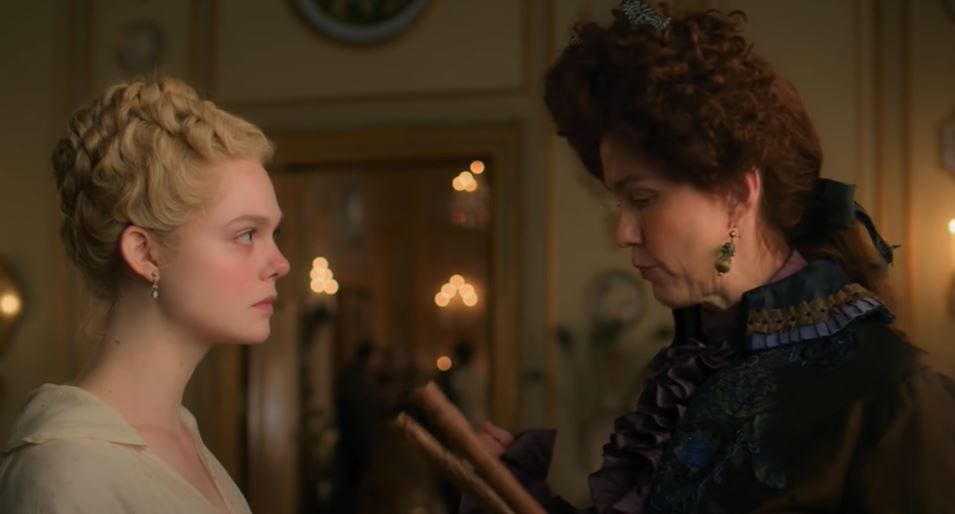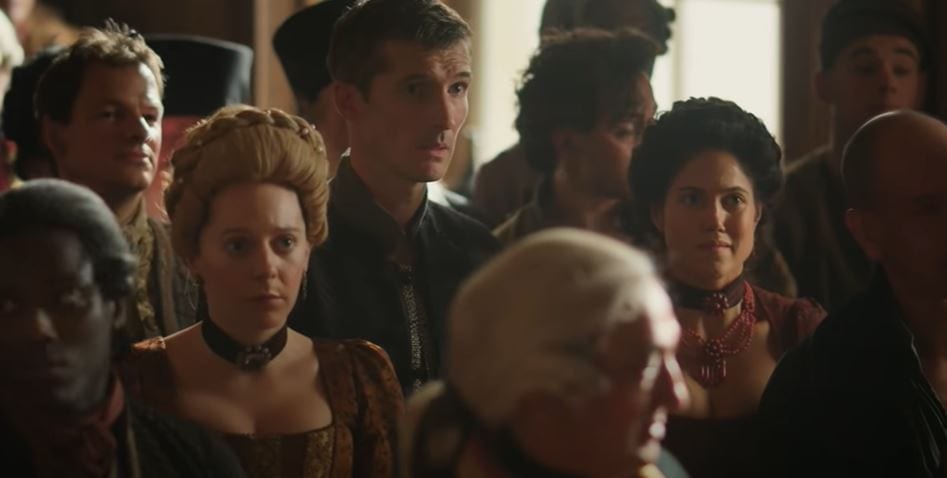At first glance, Hulu’s dramedy about the rise of Catherine the Great, famed Russian Empress, seems prime territory for the “Not Like Other Girls” trope, where a woman is “better” than her peers because she does not act like them, and typically because she loses her feminine traits to act like a man. For example, Arya Stark in Game of Thrones. It’s a backhanded compliment at best and pure sexism at its worst, and I worried The Great would play right into it.
Catherine is a young, vibrant, intelligent new Empress who arrives in Russia to marry Emperor Peter and immediately faces resistance for trying to bring science and literacy and culture to her new country. She also immediately faces resistance from the other women at court, who seem happy to be illiterate and uncultured. Her husband and his friends at court are determined to put this new Empress and her strange ideas in their proper place.
Much of the show revolves around Catherine’s plot to depose her husband because she would just be so obviously better for Russia. In her own words, she’s just so clever and smart! Of course she should rule instead! Of course she is better than the other girls!

It’s easy to watch the show and take this surface-level reading of the situation as is, that Catherine is so much smarter, cleverer, and better than the uncouth Russians around her. She does gather a following who agree that Russia should be better than it is. She does inspire change. Ultimately, she almost succeeds in her coup d’état in season 1.
But here’s the thing—and within it lies most of the humor on this very entertaining show—much of her success occurs almost entirely independent of Catherine’s constant mistakes. Catherine tries to do many things throughout season 1, and fails spectacularly the vast majority of the time. She fails in large part because she thinks she is better than everyone else and underestimates them.
Again, just looking at it at face value, Catherine is clever and smart and pretty and charming and all that. However, she doesn’t get what she wants by being cleverer, smarter, prettier, and more charming than everyone else. The Great loves to tell the audience one thing and then show the exact opposite. It’s absolutely hilarious and endlessly entertaining. Catherine just cannot help but mess things up, but somehow bungles her way into succeeding through reasons sometimes having nothing to do with her.
This dichotomy begins early with Catherine’s attempts to “seduce” one of Peter’s inner circle, Orlo, over to her side. Everyone treats Orlo like a dumb, lonely nerd. Catherine approaches him like a dumb, lonely nerd. The attempt backfires the second Orlo realizes what Catherine is attempting. Now, this is intentional, since the sexually inexperienced Catherine is obviously out of her league. Of course she would fail at seduction.
Where The Great smacks down the “not like other girls” trope comes when Catherine chases the flustered Orlo afterwards. Here is where we expect the charismatic, idealistic Catherine to use her words to convince Orlo, who the audience knows to be dissatisfied with Peter, that replacing the Russian emperor in favor of Catherine is a good idea. It was the plan Catherine wanted to go with all along, to convince Orlo of the purity of her vision.
Except Orlo is immediately scared off by Catherine’s suggestion. She blunders just as badly as she did during the seduction attempt. Yes, Orlo does eventually join up, but only after Peter pushes him too far. Sheer luck and fortunate timing recruits Orlo.
So much of Catherine’s blunders result from thinking she is so much better than everyone else. She finds out soon after arrival that the other women at court are illiterate. This immediately leads her to believe she is much smarter than them, and can easily peel support away from the most influential of them. Naturally, it goes badly. She rightfully assumes Peter to be an utter idiot, yet he always undoes her schemes. She thinks she is pretty and passionate enough to capture his attention, yet fails to take Peter away from his favorite mistress.
Catherine constantly fails at trying to win because of how different she is. Whenever she bases a scheme on doing things her way, or by banking on the fact she came from somewhere “better” than Russia, she fails miserably. The most important lesson she learns throughout The Great’s first season is the value of humility and assimilation. It is not until Catherine accepts this and begins adapting to Russian culture that she truly makes gains in her overthrow scheme.
The execution is excellent, and does a terrific job setting Catherine up for prime “not like other girls” scenarios that backfire repeatedly.
I may be giving off the impression that Catherine’s failures are because she’s actually stupid and inept, so The Great attacks this trope by making everyone stupid and inept. That is not the case. Rather, The Great surprises you with the deft intelligence of everyone around her. Yes, Peter III is an absolute moron. He’s a misogynistic jackass with zero capacity to be the person he thinks he is. He’s still capable of recognizing Catherine’s schemes, he is an adept fighter, and his instincts catch you by surprise. General Velementov comes across like a lecherous, overweight bumbler, but he has an acute political instinct and proves how he gained such a position.
It is a delicate balance between comic stupidity and necessary competency, but The Great tends to maintain the balance. Catherine is an intelligent person with good ideas and the charisma to make her dreams a reality, but they balance her out with the difficulty of her mission and the savvy of those around her. Without that balance, Catherine’s journey wouldn’t feel quite as entertaining since you end up with either everyone being too stupid, or everything being too serious.
Another key to The Great’s tackling of “not like other girls” comes from the fact that Catherine doesn’t have to morph into someone she isn’t. The mistake stories make with introducing characters into new settings and demanding that they adapt to said setting comes from the risk that you lose the interesting characteristics of said character. See how Arya and Sansa Stark lose their original traits to transform into cold, emotionless robots focused on “men’s” concerns. Catherine could have just changed into a clone of everyone around her, or at least ended up like Peter or the more vicious men around her. The end result could have been a show that kills the person she once was and doesn’t realize where it went wrong.
While Catherine does adapt to Russian culture, it’s more a question of respect than change. She learns to respect their traditions rather than tear them down. What starts as Catherine’s mission to change Russia into the kind of French utopia she always talks up becomes a mission to instead blend the best of both worlds.
This is another problem with “not like other girls,” where stories make the “other girls” represent the worse side of civilization. The Great not only avoids this, but by the end, Catherine has adopted Russia as her true home. She considers herself Russian at heart. Again, it’s a difficult balance to maintain, but one The Great manages consistently well.
Finally, and probably most importantly, The Great strikes at the very heart of “not like other girls” but making the “other girls” freaking great.

Experience teaches that in order to make one woman character not like the others, creators usually make all the other women awful. They will be dumb, vain, catty, mean characters who are looked down upon for traditionally feminine traits and concerns. The more they want to emphasize how different one woman is, the worse they make the others around her. Again, The Great provides familiar scenarios to suggest the show will follow this pattern. Then it completely avoids the pattern.
While the collection of court ladies don’t all get the same depth, their circumstances become clear through those used to tell the story. Like with Peter, they get their opportunities to prove their depth. This stands out mostly through Peter’s Aunt Elizabeth. She initially comes across as the most senior of the airheaded, patriarchal ladies of the court. It doesn’t take long for The Great to establish her as one of the most intelligent, influential, and pragmatic voices in Peter III’s circle. One of the great dramatic highlights of the season involves Elizabeth murdering a bastard son who poses a threat to an ill Peter’s security, and Catherine’s chances of succeeding him if Peter dies.
Catherine’s servant, Marial, is the human connection keeping her honest and focused when various flight of fancies threaten to distract from the coup. Georgina both plays rival to Catherine and represents the lengths women go to in order to maintain safety and power amongst Peter’s cruel inconsistencies. Lady Svenska initially represents the vapidity of the court, only to be contextualized through her husband’s deployments to fight a war against Sweden.
It’s not perfect, but one thing The Great never does is set Catherine up as inherently better than the women around her. She isn’t any more enlightened than they are for wanting changes. She simply has more power to make it a reality.
There are many reasons to enjoy The Great, and I could say so much more about why you should watch it. Seeing the show tear so vividly into a trope we absolutely hate around here, though, made me quite happy. It makes these attempts even better for the way they set these scenarios up, making you expect the worse, only to subvert your expectations so effectively.
“Not Like Other Girls” needs to die. I hope The Great helps that mission along.

